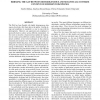Free Online Productivity Tools
i2Speak
i2Symbol
i2OCR
iTex2Img
iWeb2Print
iWeb2Shot
i2Type
iPdf2Split
iPdf2Merge
i2Bopomofo
i2Arabic
i2Style
i2Image
i2PDF
iLatex2Rtf
Sci2ools
119
click to vote
DEXAW
2010
IEEE
2010
IEEE
Bridging the Gap between Heterogeneous and Semantically Diverse Content of Different Disciplines
The Web has been flooded with highly heterogeneous data sources that freely offer their data to the public. Careful design and compliance to standards is a way to cope with the heterogeneity. However, any agreement and compliance is practically hard to achieve across different communities. In this work we describe a framework that enables the exploitation of content across different scientific disciplines. Our approach combines several novel techniques at the syntactic, structural and semantic level. In particular, we advocate that integration should take place at the much higher level, factoring out any syntactic discrepancies, and facilitating the exchange of information. We show how a novel technique for data annotation using intentional attributes can cope with data associations in high data volumes, we present a way to overcome the multilingualism barrier, and describe a new kind of database that considers data evolution as first class citizen with the additional ability to annot...
Related Content
| Added | 08 Nov 2010 |
| Updated | 08 Nov 2010 |
| Type | Conference |
| Year | 2010 |
| Where | DEXAW |
| Authors | Siarhei Bykau, Nadzeya Kiyavitskaya, Chrisa Tsinaraki, Yannis Velegrakis |
Comments (0)

